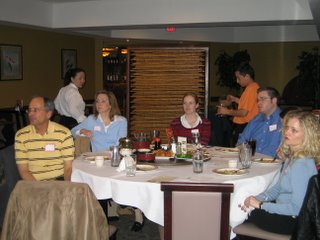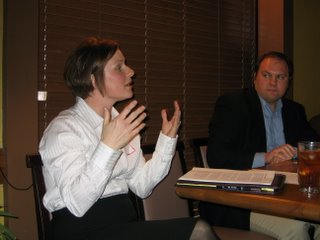By Jody Shee
 Editors earn their gray hair as they are challenged not only to ensure that the publication comes out in one piece and on time, but also to maintain editorial integrity as some unknowingly (or knowingly) chip away at it.
Editors earn their gray hair as they are challenged not only to ensure that the publication comes out in one piece and on time, but also to maintain editorial integrity as some unknowingly (or knowingly) chip away at it.For Lance Jungmeyer, editor of Vance Publishing's The Packer, a weekly newspaper with a circulation of 13,000 produce industry members, the decision to fire a reporter who plagiarized a story was clear-cut.
What he finds more difficult is handling sources who expect good coverage of their company because they advertise in the publication, Jungmeyer said at the Kansas City ASBPE chapter meeting in mid-February. He was one of two panelists who addressed ethics issues at the meeting.
Keeping the balance especially is challenging since The Packer’s readers also are its sources and advertisers, and the newspaper’s main competitor writes positive stories for its advertisers, Jungmeyer said.
 Keeping the separation between editorial and advertising is easier for a publication that doesn’t run news stories, said panelist Angie Gates. She is an advertising sales representative for Grounds Maintenance magazine published by Prism Business Media (formerly Primedia Business Magazines and Media).
Keeping the separation between editorial and advertising is easier for a publication that doesn’t run news stories, said panelist Angie Gates. She is an advertising sales representative for Grounds Maintenance magazine published by Prism Business Media (formerly Primedia Business Magazines and Media).However, it still is necessary to educate sources that they cannot dictate the coverage that will appear in the publication, Gates said as she recalled a meeting with a client who requested that they write an article explaining that his product was the best on the market. Gates listened to the editor tactfully suggest alternative articles to the client. “The researcher didn’t know journalism ethics. We have to open up and communicate and let them know,” she said.
Source reviews
When asked if any of the publications allow the sources/advertisers to review the articles before they print, the panelists and everyone in the meeting agreed that it’s a dangerous practice.
If advertisers were allowed to review the copy ahead of time, they would call their ad rep to complain if they didn’t like what was in the article, and that’s something Gates said she would rather not get in the middle of. “Not knowing makes my job easier,” she said.
Jungmeyer explains to sources who request to see the article ahead of time, “If we did that for you, we would have to do it for others. Then what would be the value of the article?” he said.
While most attending the meeting agreed that it is okay to read back a source’s quotes if they ask for it, one editor said she rarely allows that to happen. Reading quotes back opens the publication up to more problems, she said.
Editors vs. advertorials
Editors should be aware of the intent and strategy of the advertorials the advertising side comes up with, but Jungmeyer said he strongly believes that the editorial staff should not be involved in writing the advertorials. “They don’t even need to know about them,” he said.
Advertorials for Grounds Maintenance magazine are written by public relations agencies, Gates said.
Yet when asked for a show of hands, nearly half of those attending the meeting said that the editorial staff for their publications is involved in writing advertorials.
Note: This meeting sparked so much conversation that we'll continue to post more b2b ethics questions online. Read the current question here.



No comments:
Post a Comment